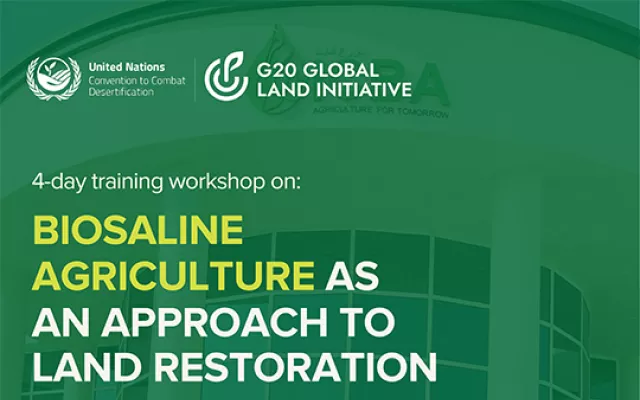First-of-its-kind Emirates Soil Museum opens its doors in Dubai
8 December 2016
The International Center for Biosaline Agriculture (ICBA) and the Abu Dhabi Fund for Development (ADFD) inaugurated today the Emirates Soil Museum, a unique facility in the Gulf Cooperation Council (GCC) countries and the Middle East and North Africa (MENA) region.
The opening of the Emirates Soil Museum is a joint initiative between ICBA and ADFD.
Speaking at the inauguration ceremony, Dr. Ismahane Elouafi, Director General of ICBA, said: “We at ICBA are very proud and happy to have partnered with ADFD for this momentous initiative. Indeed, the museum is a result of continued support by the UAE government for efforts to collect, preserve and share information about the country’s natural heritage, including soils. We are confident that the museum will serve as an excellent repository of knowledge for anyone who is interested in soil preservation and soils of the UAE.”
H.E. Mohammed Saif Al Suwaidi, Director General of ADFD, said: “ADFD is committed to drive sustainable socio-economic growth in the education and environment sectors within the UAE and abroad. Our newest venture with ICBA exemplifies our dedication to expand our scope of partnerships and bring awareness to agriculture and food security. Our nation’s continuity depends on research, innovation, environmental consciousness and scientific ingenuity. The museum will serve as a pioneering and informative resource and technical hub for the MENA region. Furthermore, it’s vital that our next generations are aware of these important issues and this partnership allows for an interactive platform that will serve the country well.”
Soils and the ecosystem services they provide, including food, fuel, fiber, and feed production, are critical for life on the Earth. Soils also play an important role in regulating greenhouse gas emissions. The largest store of terrestrial carbon is in the soils. So their preservation may contribute to climate change mitigation.
These services, along with the role of soils in the environment, agriculture, and food security, as well as the types of soil that are found in the UAE, will be the focus of the museum. Through both aboveground and underground exhibits, soil information, including soil and water salinity, soil acidity and alkalinity, why soils are of different colors, and the role of soil in water infiltration, will be showcased using interactive experiences. Customized simulators will allow visitors to see firsthand the role that soil plays in natural processes, such as the development of different types of sand dunes and water infiltration.
Soil monoliths, or vertical slices of soil that serve as a visual aid for the natural state of soil, are displayed under six themes: Winds of Time, New Soil Discovery, Soils and Ecosystem, Soils and Food Security, Soil and Climate Change, and Threats to Soil. Visitors to the museum will be able to see how simple soil changes, such as porosity, soil structure, the types of minerals present, and soil types influence water infiltration, water and nutrient holding capacities, food production, plant root development, and the accumulation of organic matter. The museum also features a library collection of soil publications and soil atlases of the GCC countries.
The idea for the museum, which is the first of its kind in the region, was conceived at the international conference “Soil Classification and Reclamation of Degraded Lands in Arid Environments” in Abu Dhabi in 2010.
In addition to serving as an information hub, the museum is a critical element of building awareness around the issues of soil degradation and loss.
Information and education, like that provided by the museum, can play a critical role in raising awareness about threats to soil and provide an opportunity for people to become better advocates for policies and practices that will protect the soils nationally and globally.
Based on the premises of ICBA in Dubai, the museum is designed to cater to the needs of a variety of visitors, including school children, university students, researchers, professionals and scientists, environmentalists, professional contractors, land use planners, decision- and policy-makers.
It is hoped that the museum will help to raise awareness and foster appreciation of the importance of soils for national development and food security.










